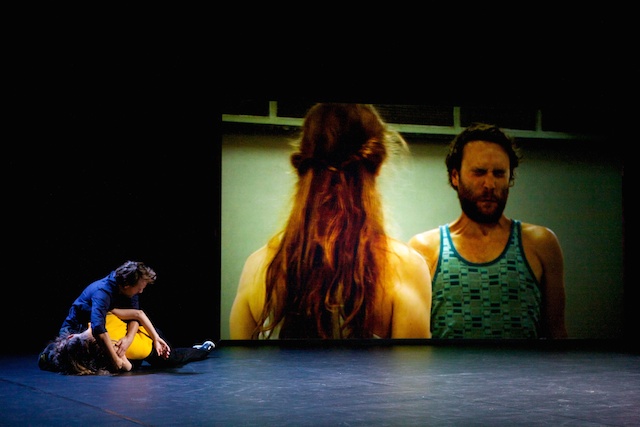Tom Struyf is the sort of guy who purrs when he’s happy—say, when he’s eating Nutella. He’s the sort of guy who’s told by a girl, after their first date, that “she believes she finds him nice.” He’s the sort of guy who, as a six-year-old, put out his own newspaper, and kept publishing it, encroaching burnout be damned—his subscribers had paid for 10 issues, and he would deliver. After a few minutes onstage, he’s already the friend you trust with your secrets, or the neighbor you ask to feed your cat when you go on vacation.
“I just tried to do it as good as possible,” Struyf says. “Like I’ve always done.”
And what the Belgian artist does here, in “Another great year for fishing”—the closing piece at the Stückemarkt, Theatertreffen’s showcase of five young writers from across Europe—is honest and generous. And after several days of freighted topics, metatheatrical commentary and nonsense languages, also immensely refreshing.
“Another great year,” which Struyf wrote and performs in, braids together storytelling, video interviews and dance. On one level, it’s a Moth-style confessional. Struyf, in a dark blue button-down and sneakers, tells us about the stress he suffered as a six-year-old newspaper publisher, about the time he racked up too many speeding tickets, about the sign he once saw in a dirty bathroom: “If you ever find yourself in the wrong story, leave.” He then recounts a trip to Cape Town, where the hotel concierge speaks of the most wonderful place in the world and persuades Struyf to rent a car and drive alone into the bush. (Things, of course, don’t go quite according to plan.)
Struyf’s narrative is cut with video interviews playing on a large screen on the otherwise bare stage. We meet a psychiatrist, an anthropologist, a former politician, a self-proclaimed spin doctor, a journalist. They speak about burnout, vulnerability, decision fatigue, credibility, cynicism, information overload, obsession with happiness. #firstworldproblems, in other words, thrown into stark relief by the anthropologist’s observations about the Maasai—and tempered with humor, as when the psychiatrist rambles from Christina Aguilera to his own musical ineptitude.
Sie sehen gerade einen Platzhalterinhalt von Vimeo. Um auf den eigentlichen Inhalt zuzugreifen, klicken Sie auf die Schaltfläche unten. Bitte beachten Sie, dass dabei Daten an Drittanbieter weitergegeben werden.
Adding another layer—a wonderfully rich one—is long-limbed dancer Nelle Hens. Early on, as the interviews play onscreen, she makes her body limp. She falls, over and over and over again. Struyf catches her, over and over and over again, repeatedly contending with this wriggly, overcooked noodle. Later, Hens seizes control. “You have two minutes to get really sweaty,” she commands Struyf, keeping close watch as he runs in circles and swivels his hips and crawls on the floor.
But for much of the time, the two simply lean against one another. They’re in uninterrupted contact, constantly shifting their weight and balance: sometimes back-to-back, sometimes with their arms on each other’s shoulders. Hens is the calm foil to Struyf’s anxious energy. Their angles are precarious. It’s a geometry lesson. It’s a master workshop in trust. It’s entrancing.
And as they move, Struyf continues to describe his hapless South African voyage. He’s emotional but not cheap, earnest but self-aware: “I’m a stupid rich European asshole in a glitzy car and it’s getting dark.“
Eventually, he’ll dance himself to sweat-drenched exhaustion. And he’ll do this with his eyes closed, as Hens gently steers him. And he’ll reflect on the role of storytelling, and talk about Nutella, and ask us to imagine a world where everyone purred when they were happy, and then a world in which we could shut our ears like we shut our eyes. And maybe—just like Nutella—it’s a little sugary. But it’s a sincerity that seizes you, and that’s not something that can be faked.
